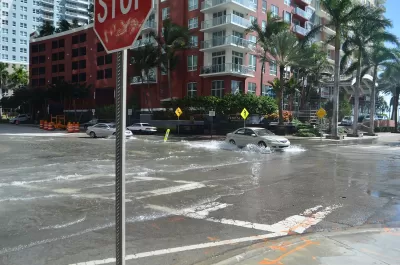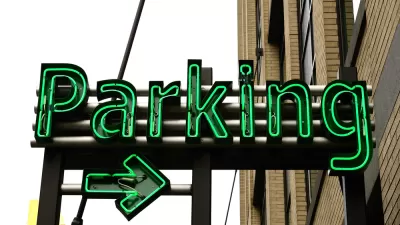It's unclear when the law will take effect, but the Miami City Commission has approved that an ordinance that heads in the opposite direction of current planning trends and even the city's own groundbreaking zoning code.

"Miami commissioners voted 4-1 last week in favor of an ordinance that would essentially force developers to build more parking," according to an article by the Next Miami.
Commissioner Manolo Reyes is quoted in the article saying Miami is "not a pedestrian and bicycle city" and "we don’t have a mass transit system, period."
"Commissioner Joe Carollo also spoke in favor of the ordinance at the meeting," according to the article. "He has previously called developers 'greedy' for wanting to build less parking."
As for the changes proposed by the ordinance: "Developers will be required to build the full amount of parking required by zoning, unless they can get a commission vote to allow a reduction for their specific project. Parking reduction waivers by city planners for projects near transit stops will no longer be permitted."
According to the article, the commissioners overrode the objections of a Miami zoning task force and the city's Planning and Zoning Board in voting for the approval for the ordinance.
According to the Parking Reform Network, Miami waived minimum parking requirements for newly constructed buildings in the city's downtown when it adopted the Miami 21 form-based code in 2009.
Previous coverage, published in February 2022 by the Next Miami, provides more background. Neither article explains whether the ordinance has been fully adopted and when the law would take effect if so. Please let us know in the comments if you have more information.
FULL STORY: Miami ‘Is Not A Pedestrian & Bicycle City,’ Commissioner Says, Before Voting To Require More Parking

Alabama: Trump Terminates Settlements for Black Communities Harmed By Raw Sewage
Trump deemed the landmark civil rights agreement “illegal DEI and environmental justice policy.”

Study: Maui’s Plan to Convert Vacation Rentals to Long-Term Housing Could Cause Nearly $1 Billion Economic Loss
The plan would reduce visitor accommodation by 25% resulting in 1,900 jobs lost.

Planetizen Federal Action Tracker
A weekly monitor of how Trump’s orders and actions are impacting planners and planning in America.

Waymo Gets Permission to Map SF’s Market Street
If allowed to operate on the traffic-restricted street, Waymo’s autonomous taxis would have a leg up over ride-hailing competitors — and counter the city’s efforts to grow bike and pedestrian on the thoroughfare.

Parklet Symposium Highlights the Success of Shared Spaces
Parklets got a boost during the Covid-19 pandemic, when the concept was translated to outdoor dining programs that offered restaurants a lifeline during the shutdown.

Federal Homelessness Agency Places Entire Staff on Leave
The U.S. Interagency Council on Homelessness is the only federal agency dedicated to preventing and ending homelessness.
Urban Design for Planners 1: Software Tools
This six-course series explores essential urban design concepts using open source software and equips planners with the tools they need to participate fully in the urban design process.
Planning for Universal Design
Learn the tools for implementing Universal Design in planning regulations.
Caltrans
Smith Gee Studio
Institute for Housing and Urban Development Studies (IHS)
City of Grandview
Harvard GSD Executive Education
Toledo-Lucas County Plan Commissions
Salt Lake City
NYU Wagner Graduate School of Public Service





























